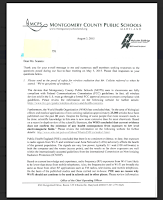Ashland, Massachusetts Public Schools have implemented Wi-Fi Device "Best Practices" which include turning the Wi-Fi off when not in use and keeping devices on a table.
Ashland, MA -- (SBWIRE) -- 09/28/2015 --Based on its own review of the matter, the Ashland Public School District is reducing wireless radiation exposures to children by instituting district wide “best practices for mobile devices”. Spurred by parent Cecelia Doucette’s concerns about the lack of safety data on Wi-Fi and children, the district investigated the issue and developed a policy to substantially reduce wireless exposures to students and staff. Doucette not only brought the issue to the district’s attention, but then also worked with state legislatures who introduced two bills concerning electromagnetic radiation this session.
The Environmental Health Trust (EHT) submitted written testimony on MA Senate Bill 1222 after expert scientists presented information on wireless health risks at a briefing at the Massachusetts State House in June 2015.
The Environmental Health Trust (EHT) submitted written testimony on MA Senate Bill 1222 after expert scientists presented information on wireless health risks at a briefing at the Massachusetts State House in June 2015.
Watch Cecelia Doucette speak about her efforts to legislators in this video.
Since wireless devices are constantly emitting radiation even when the user is not using the Internet, the instruction to "turn it off when not in use " stops the Wi-Fi antennas from continuously emitting radiation and is one simple way to reduce the radiation dose and exposure time for children and staff.
Instructions for “Best Practices” are posted in every classroom and include:
- Turn off the device when not in use
- Turn Wi-Fi on only when needed
- Always place the mobile device on a solid surface
- Viewing distance should be a minimum of 12 inches from the screen
- Specific product information guides are available through the IT department
- We ask that staff members regularly remind and instruct students in using best practices in regards to mobile devices
Ashland's Best Practice of “keeping the device on a table” and no closer than a 12 inch viewing distance is critically important. Laptops and tablets have fine print warnings buried in their manuals specifically stating that the laptop should be at least 8 inches away from the user so that the user is not exposed to radiation levels that exceed as-tested FCC levels. If a device is used on a lap, as is common practice, the student could receive radiation levels far exceeding FCC limits. FCC limits are set to prevent the radiation from heating the brain and body but are not set to avoid chronic impacts on the developing nervous system or reproductive organs.
Suffolk County in New York voted to label wireless routers in all public buildings including schools. The US United Federation of Teachers Union now hosts a webpage on how to reduce exposures to protect pregnant women, other staff members and students.
The Environmental Health Trust maintains a regularly updated database of these worldwide precautionary policies on wireless related to children and schools.
Suffolk County in New York voted to label wireless routers in all public buildings including schools. The US United Federation of Teachers Union now hosts a webpage on how to reduce exposures to protect pregnant women, other staff members and students.
The Environmental Health Trust maintains a regularly updated database of these worldwide precautionary policies on wireless related to children and schools.
Read the Full Release Online at http://www.sbwire.com/press-releases/first-us-public-school-district-limits-wi-fi-radiation-exposure-to-students-and-staff-628735.htm






